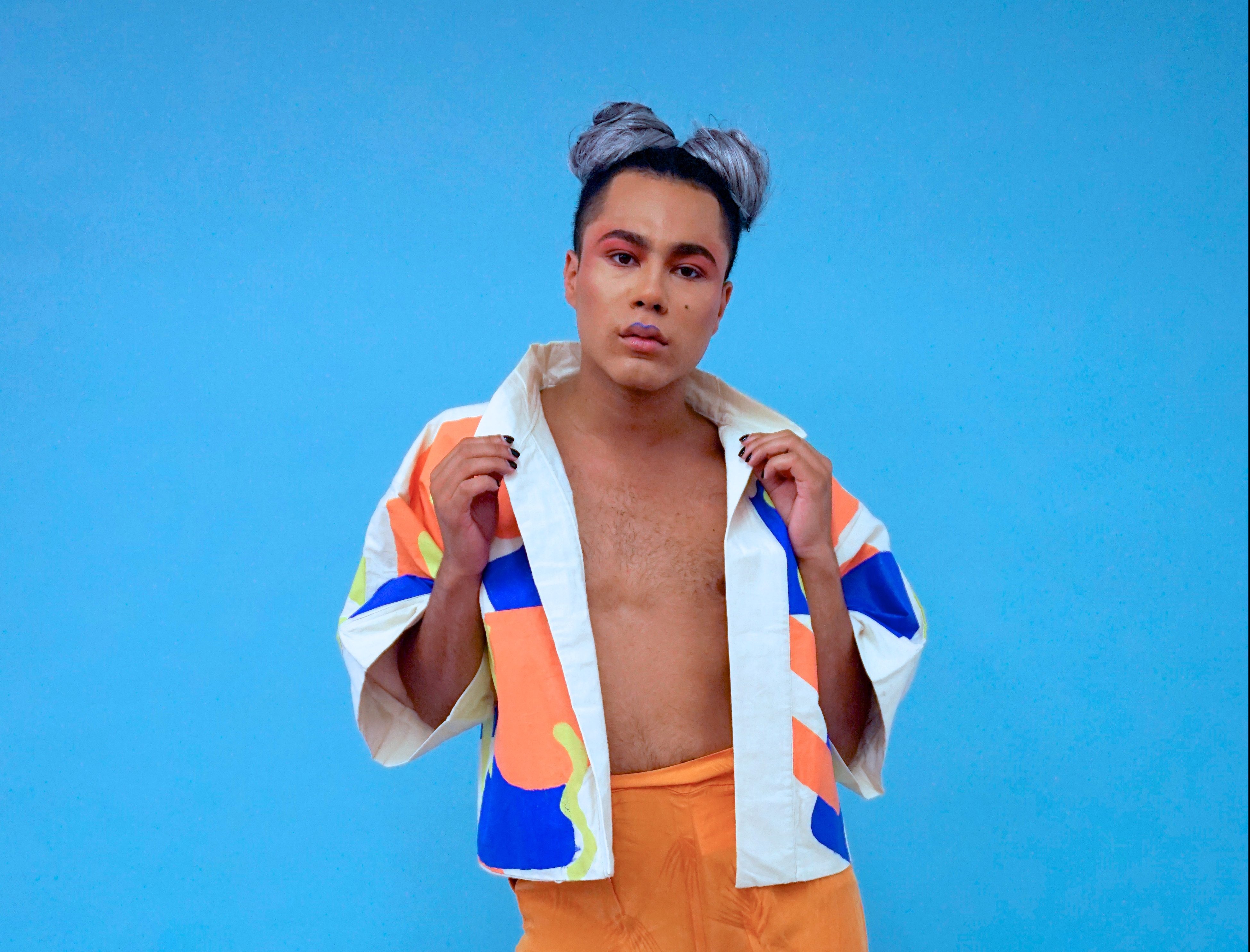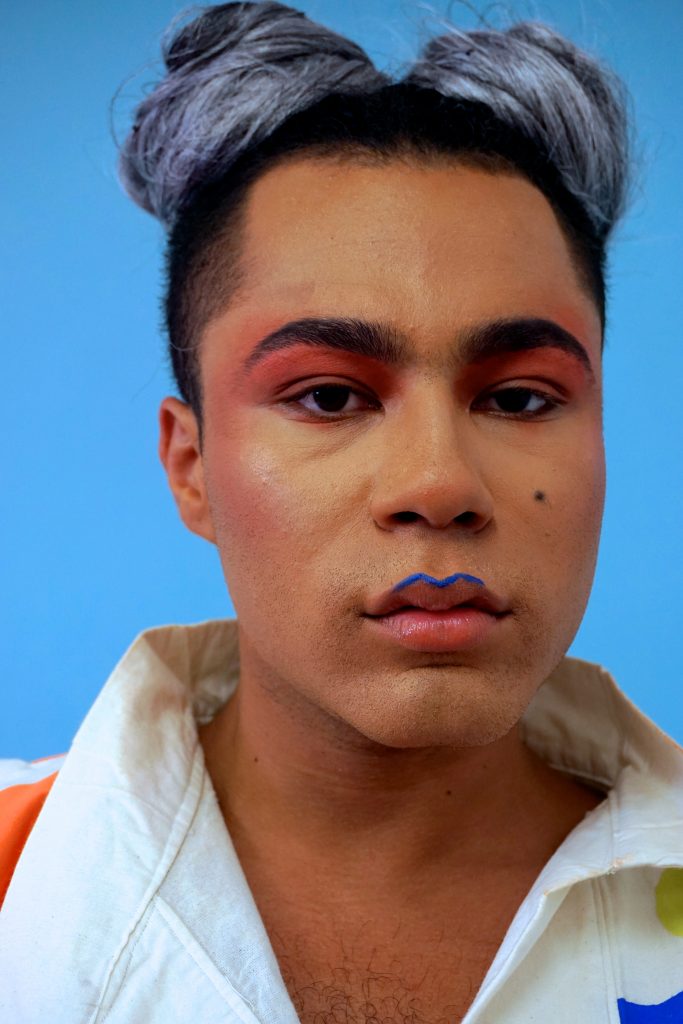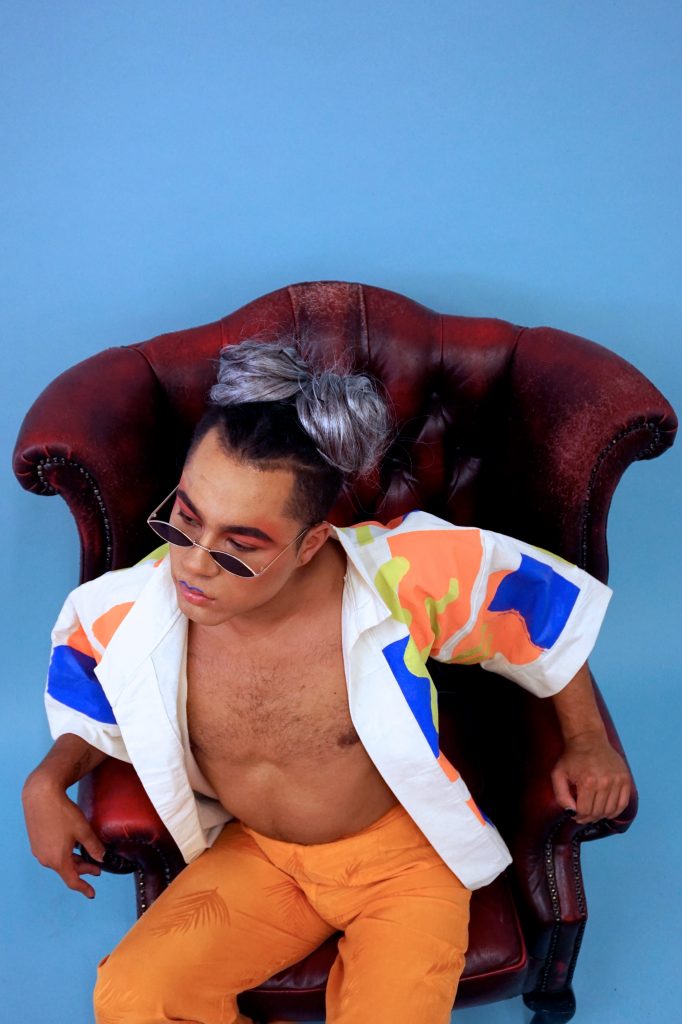
‘Liberation isn’t liberation if it’s contingent on politeness’: an interview with Travis Alabanza
Micha Frazer-Carroll
31 Oct 2018
Me and Travis bump into each other in the street in Peckham, both with our maps open, looking for the way to the studio.
A queer, non-binary performance artist and activist who’s been making waves on the scene in recent years, Travis really shot into the public spotlight after calling out Topshop for transphobic abuse in one of their changing rooms in November 2017. It’s been a rollercoaster of a year for them since then, with lots of exposure, which has also made them reflect on their relationship with both self, and collective, care.
When we get inside the studio, part of the room is made up to look like a living room, and we tuck our legs up on a velvet sofa with a mug of water each. It’s half set and props, but also a bit real – thirty seconds in and it feels like a cosy catch-up.
gal-dem: The last year has been wild. Suddenly your name is everywhere, but I was wondering what that trajectory has been like for you?
Travis Alabanza: It’s kind of been a year of getting used to people knowing who you are before you know who they are. After the release of my poetry book, but also the whole incident with Topshop – I suddenly have a really big platform.
What do you think has caused that shift?
Suddenly, particularly black and brown queer and trans bodies, have cultural relevance and capital that we didn’t have before. Media publications are realising that 1) we tell more interesting stories, 2) that people are needing and wanting to see us, and 3) really, if i’m honest, the sad truth is that we make money for them. And so now, people are suddenly pretending.
I think the best example of this is what’s happened with the word “intersectional”, it’s everywhere. Every single publication, place, thing, has to say they’re “intersectional”.
“People know us between places of trauma. That’s how they are used to seeing us”
And they’re using it wrong as well.
Kimberlé [Crenshaw, who coined the term in 1989] must be so fucking angry! What I’ve learned in the last year is that these places deep down are only interested in us when we’re giving them something.
Pure commodification. Also the particular narratives they want us to play to.
Yes, people know us between places of trauma. That’s how they are used to seeing us, as weak, and suffering and as a result of that, as needing their help. But now I’m not really interested in giving people that trauma, and my shows look very different.
You know these…I don’t call them the ‘Beckies’, I call them the ‘Susans’ and ‘Rebeccas’ of the art world – they wear washed out acid jeans and New Balances, and they’ve suddenly moved to Peckham for two years before going back up to North. They know how to deal with us when they’re talking about “woe is us”, but they don’t know how to talk about us or deal with us when we come in knowing what we want, when we come in not polite. Liberation isn’t liberation if it’s contingent on politeness. And this moment we’re in, it’s still dependent on us playing by certain rules. Which is why I don’t think it’s really real.

By Aisha Pegley
Do you see a relationship between your guest lecturing and your art?
Now I’m more confident and I’ve done so many lectures over the past year, I’m really enjoying trying to fuck up what we think should be in these academic spaces. Two years ago when I was first doing university stuff, I would write a speech, and stick to what I thought I had to do. Now I’ve become a lot more skilled in bending what people expect me to do in those spaces, and see it as a performance.
One example: I was speaking at a bougie art college about a month ago and loads of people were there, I was giving a keynote. It was all set up very formally. But when I was introduced, I just paused, slowly went to the mic, and then said calmly…‘I’m just gonna list you all my five favourite swear words that I have at the moment’.
Number one I think was ‘fuckwit’. After I finished the list I stood in silence, and I was like, ‘I’m not going to say ‘thank you’ for being here, I’m going to say ‘you’re welcome’… I want anyone else in this room that’s similar to me to know that these spaces can’t survive without us’.
“I didn’t survive uni, I dropped out because of racism and because of transphobia. So when I go in and I see the one black person in that class, I’m like ‘I’m doing this for you”
They wanted the lecture to be about gender, but instead I just talked to them about the history of the building, race, colonisation and all these things, but in a way that was very calm, and long, and everyone was very confused. I said to them at the end ‘thank you for watching my performance. Now I’ll take some questions’.
And everyone was shook.
Later, I asked who was a professor in the room, and they put their hands up. I asked them to come up and recite every name on their reading lists. And I was like ‘go on, do it, don’t be afraid, you’ve published it. What’s the reading list?’ And then I asked, ‘okay, how many trans people of colour are on there?’ I turned it into this interview – it was confrontational.
I didn’t survive uni, I dropped out because of racism and because of transphobia. So when I go in and I see the one black person in that class, I’m like ‘I’m doing this for you, I don’t really care about the rest of the people in the room’.
No one is thinking about the ways in which colonisation has everything to do with transphobia. So when I get into these spaces I’m really just trying to work against what they’ve been thinking.
Can you tell me a bit about your new show?
So, my new show is called “Burgerz” – it came about because someone threw a burger at me in broad daylight, and called me a “tr*nny” two years ago. And from that moment onwards, I recorded myself in public for six months, every time i went outside. At in that time in my life I was needing to go out every day in dresses and makeup, so I was naturally getting lots and lots and lots of harassment.
But how can have a burger thrown at you on Waterloo bridge, a busy bridge, during lunchtime rush, surrounded by about 200 people, and no one do anything?
You say your work is confrontational – do you expect that your audience members will participate?
I think it’s going to be different every day. But yes, I think they will, and I’m expecting fake solidarity from white people – particularly white women. I think white women in many ways are leading and upholding transmisogyny and patriarchy at the moment.
“When the man threw the burger at me, I wasn’t surprised, but what i’m still processing is that all the women around didn’t do anything”
When the man threw the burger at me, I wasn’t surprised, but what i’m still processing is that all the women around didn’t do anything. And what I’ve seen when we’ve done the show is that the first people to cry in the room are white women. The first people to protest are the white women. I want to see is whether that performance in the room will go out into the real world.
As a transfeminine person, particularly as someone who doesn’t “pass”, whatever that means, I’m really not allowed to critique women. Every time I critique women, I’m instantly boxed back in as an angry sexist man. What I love about the stage is I have space to be able to do that, and feel safe doing that.
What’s your relationship with secrets, particularly as someone who has been flung into the public eye?
I’m gassed that this issue is about secrets – it forces us to be intimate. I think the internet has fucked us all up, in great ways and in awful ways. It’s kind of left me for six, I think now you can’t do anything without promoting yourself, especially if you’re a solo artist.

By Aisha Pegley
You have to become a brand too.
Which makes me want to throw up. But also I see how I play into it too. And so often now, instead of asking me how I am, friends will say ‘well this happened last week, well done,’ and I have to explain to them that I’m putting a particular version of me online. I’m not putting on my Instagram when I went to KFC and cried over the fact that someone just broke up with me. I’m not putting on my story when I got fucked up and had a hangover the next day. You know, I’m followed online by everyone who books and hires me, it’s a work account.
You don’t want to seem ungrateful. But when this happens, it doesn’t allow you to have any moments of not being perfect. I understand why we often force images of perfection on marginalised bodies – we want to lift up the few people who are like us who are occupying these spaces.
Of course, we’re all capable of being simultaneously important, brave, inspiring, whilst also being scared, awful, horrible. I’m capable of being beautiful, whilst ugly. What I’m trying to say in my work is that we’re all lonely – that’s the secret we’re all holding onto. We’re all secretly depressed. And we’re all trying to figure it out.
What advice would you give to marginalised people under all this pressure to do it all, and to be perfect?
I and you, are still figuring it out. And we don’t have all the answers – we shouldn’t be expected to. What’s helped me loads is finding spaces, which could just be one friend, or one phone call you have with someone across the world, or a club you know you can go to, a space where you know you’re allowed to fail.
Find that person. And I do it for someone else. This is the secret, that self-care sometimes becomes this individual thing, but for me the best self-care is realising that I can’t do this alone.
Collective care. Is that what you’d like to see more of in the year ahead?
Yes, I particularly want us as black and brown women, trans, non-binary folk, to really just love each other harder even more. We’ve started doing it already, but this should be the year that we come out and really fucking love each other. I really want to see us connecting all the dots between us, and realising that we can do it all together.
Anything else to you want to tell us?
Well, only one thing, only that I just thought of a secret, that I didn’t realise I had kept a secret, until right now. It’s that…um…
[Pauses, then laughs]…actually I don’t even want to say it, that’s why it’s a secret.
[We both laugh for a while]
You don’t have to say.
Suddenly I was like “Travis, what the fuck are you doing?” I got too relaxed.
Burgerz runs until 3rd November at the Hackney Showroom.
Photography by Aisha Pegley
Styling by Umber Ghauri









